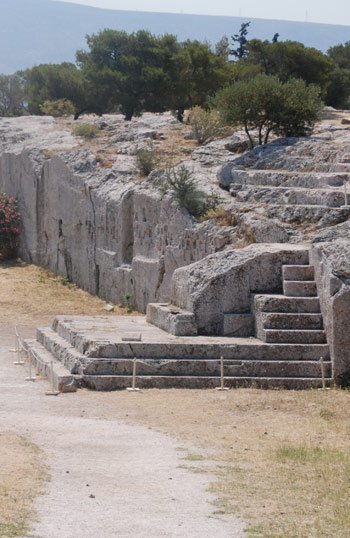|
Several things need to be said in response. First on the question of democracy, that if it was a participation of 15%, that is about 14.999% larger than any other place had ever attempted. Everywhere else it was the king and those who caught his ear. In Athens for the first time we have leaders being held accountable to an assembly. In Athens we have office holders elected to limited terms, whose power is not absolute and who must gain agreement for their policies in an open assembly. Secondly, as for slaves. It is one of the three flaws in its organization that it had slaves. But in most other places, everyone who wasn't nobility was a slave in either name or reality or both. Athens didn't invent slavery, or perfect it as a system. (The other two flaws are how it dealt with women, and its desire for empire, flaws it shared with every other society as well.) Thirdly, do you realize that many offices in Athens were held by lot? And that over the lifetime of an adult male, he had an good chance of actually serving in some office, since most offices could be held only for a year and only once in your life. It was assumed that all could and should have the skills to hold political office. This is a true notion of democracy that we'd never attempt. As for the role of the ladies, it is not quite so closeted as some think. There were religious orders run by women, religious festivals organized by women. Officers of those organizations would have to report to the assembly as well and give an account of their operations. Women did more than sit at home and spin yarn, even though it is true they were barred from formal political power. It is not the case, as some have said, that there were some dim "women's quarters" at the back of the house that all women were confined to 24 hours a day. Even while at home, wives of the upper and middle class acted as overseers or managers to a complicated domestic estate and its production of food and goods. This is not political power, but it also needs to be said that there are more systems of power than the one we choose to label "government." This can be more true in a society less obsessed with turning everything into law than ours. Informal networks, volunteer organizations, the desire of men for peace at home all allowed women to have influence. But it is true that Athens made no particular progress on the rights of women. And most crushingly for the critics, would be the reaction of Athens to our democracy. They would not think that we had one at all. They would say that all we did is choose between branches of the aristocracy - when we vote, we simply select which group of rich people will rule us. The rich try to bribe us with favors, and if one branch of the wealthy goes to far in upsetting the ordinary folk, another branch of the wealthy may pander to our needs, but that is a different thing than self-government. When all the reconstructionist dust settles, Athens still commands our attention for its achievement. |
 |
| Last modified 1/28/10; posted 6/29/2000. Original content © 2010, 2002 John P. Nordin |